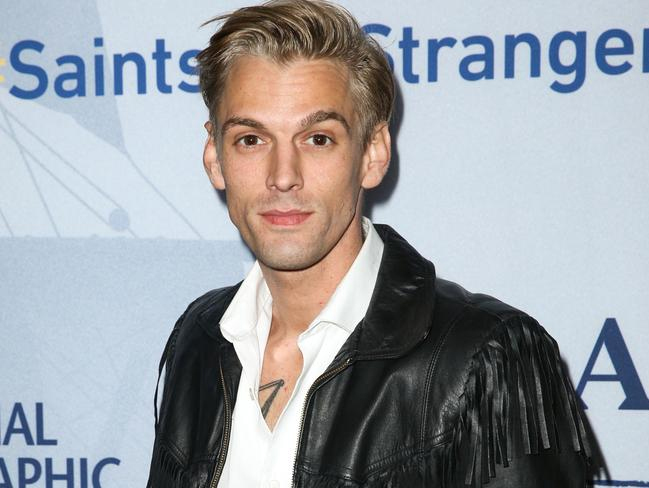
Aaron Carter was an American singer, rapper, and actor who rose to prominence as a teenage pop sensation in the late 1990s and early 2000s. Known for his boyish charm, catchy music, and family connections—most notably as the younger brother of Nick Carter from the Backstreet Boys—Aaron Carter carved out a significant place for himself in the world of pop culture. His early success as a young solo artist brought him international fame, but his later years were marked by struggles with mental health, substance abuse, and legal issues. Despite his tumultuous personal life, Aaron Carter’s influence on early 2000s pop culture remains undeniable.
Early Life and Family Background
Aaron Charles Carter was born on December 7, 1987 in Tampa, Florida, to Robert Gene Carter and Jane Elizabeth Spaulding. He was the younger sibling of Nick Carter, a member of the popular boy band the Backstreet Boys, and one of five children. His siblings include Angel Carter, his twin sister, Leslie Carter, who pursued a brief career in music, and Bobbie Jean Carter.
Growing up in a musically inclined family, Aaron was exposed to the entertainment industry from a young age. His brother Nick’s success with the Backstreet Boys provided Aaron with a unique opportunity to pursue a music career. Aaron’s early exposure to music, paired with his natural talent and charm, enabled him to start his career at an extraordinarily young age. He began performing as a singer at the age of seven, and by the time he was nine years old, he had his first taste of international fame.
Breakthrough and Early Career
Aaron Carter’s music career began when he opened for the Backstreet Boys during their European tour in 1997. His debut single, a cover of The Jets’ hit song “Crush on You,” was released that same year. The single’s popularity quickly garnered him attention, and it wasn’t long before he released his self-titled debut album, Aaron Carter, in December 1997. The album was a commercial success, particularly in Europe, where it achieved gold and platinum certifications in several countries.
.
.
His sophomore album, Aaron’s Party (Come Get It), released in 2000 when he was just 12 years old, truly launched him into superstardom. The album was packed with catchy, kid-friendly pop tracks like “I Want Candy” and “That’s How I Beat Shaq.” It sold over three million copies in the United States and made Aaron Carter a household name among children and preteens. The success of the album led to appearances on Nickelodeon, including live performances at their annual Kid’s Choice Awards, and a tour with Britney Spears.
Aaron’s Party (Come Get It) was followed by Oh Aaron in 2001 and Another Earthquake! in 2002. Both albums continued to target his young fanbase and were accompanied by extensive tours. By this time, Aaron had not only solidified his status as a pop star but also as a teen idol, appearing in TV shows, movies, and on magazine covers. His charm and talent extended to television, where he guest-starred in shows like Lizzie McGuire and Sabrina the Teenage Witch.
His success continued to grow with the release of a concert DVD, multiple music videos, and an appearance on the soundtrack for the popular animated movie Jimmy Neutron: Boy Genius.
Family Connections and Reality TV
A significant part of Aaron Carter’s identity as a pop star was his connection to the Carter family, particularly his relationship with his brother Nick. While the Backstreet Boys were one of the biggest boy bands in the world, Aaron was able to ride that wave of popularity, often being compared to his older brother and benefiting from the family name.
In 2006, the Carter family’s dynamic was further exposed to the public through the reality television show House of Carters, which aired on E!. The show followed the lives of Aaron, Nick, and their siblings as they navigated their careers and personal relationships. While the show shed light on the bonds within the family, it also highlighted the dysfunction and tensions, including the challenges of growing up in the entertainment industry. House of Carters was short-lived, lasting only one season, but it gave the public insight into Aaron’s struggles with fame, family, and identity.
Struggles and Personal Challenges
Aaron Carter’s life in the public eye was not without its hardships. As he transitioned from child star to adult, his life became increasingly difficult. The pressures of fame, combined with the struggles of growing up in the spotlight, took a toll on his mental health and personal life.
By his late teens, Aaron began facing legal and financial difficulties. In 2003, he filed a lawsuit against his former manager, alleging that he had been defrauded of a significant portion of his earnings. Additionally, Carter filed for bankruptcy in 2013, citing over $3.5 million in debt. Most of the debt was related to unpaid taxes from his early career, which indicated mismanagement of his finances during his peak years of success.
In addition to financial troubles, Aaron Carter publicly battled substance abuse. He entered rehabilitation facilities multiple times to address issues with addiction, which were often exacerbated by his struggles with mental health. In interviews and social media posts, Aaron was open about his diagnoses, including anxiety, schizophrenia, multiple personality disorder, and manic depression.
Aaron Carter’s personal life was further complicated by tumultuous relationships, some of which were played out in the media. His romantic life became fodder for tabloids, and he faced legal issues stemming from altercations with family members and significant others. In 2017, Aaron made headlines when he was arrested for driving under the influence and possession of marijuana.
Despite these challenges, Aaron Carter remained committed to his music, continuing to release singles and albums. In 2018, he released his fifth studio album, LøVë, marking a departure from his earlier teen-pop sound into a more mature, electronic style. Though the album did not achieve the commercial success of his early work, it signaled his determination to continue evolving as an artist.
Later Career and Legacy
Aaron Carter’s later years were marked by attempts to rebuild both his personal life and his music career. He maintained a presence on social media, where he communicated with fans and often made headlines with erratic behavior, emotional outbursts, and legal conflicts. Despite the controversies, he maintained a loyal fanbase from his early 2000s peak, many of whom continued to follow his journey through personal and professional struggles.
.

.
Carter’s influence on early 2000s pop culture cannot be overstated. At the height of his fame, he was one of the most prominent child stars of his generation, bridging the gap between the bubblegum pop of the late 1990s and the teen-oriented entertainment that dominated early 2000s media. His youthful, carefree image embodied the era’s spirit of fun and lightheartedness.
Moreover, his music and persona left an indelible mark on millennial pop culture. Songs like “I Want Candy” and “Aaron’s Party (Come Get It)” are still fondly remembered by fans who grew up during that time. His early albums, music videos, and TV appearances remain iconic representations of the teen pop wave of the early 2000s.
Death and Reflections on a Troubled Life
On November 5, 2022, Aaron Carter was found dead at his home in Lancaster, California. He was 34 years old. His sudden death shocked fans and brought renewed attention to the difficult path he had walked throughout his life. The exact cause of death was initially not confirmed, but the news underscored the ongoing issues he had faced with mental health, substance abuse, and the pressures of fame.
In the wake of his death, many reflected on the tragic nature of Carter’s life. While he had achieved immense success at a young age, his later years were marked by instability and struggles that, tragically, he was never able to fully overcome. Friends, family, and fans paid tribute to him, remembering his contributions to pop music and his influence on a generation of young listeners.
Aaron Carter’s story is one of early success, personal turmoil, and the harsh realities of life in the entertainment industry. His rise to fame as a child star came with challenges that many young performers face, and his later years highlight the difficulty of maintaining stability in the aftermath of early fame. Despite his struggles, Carter’s music continues to resonate with those who grew up listening to him, and his legacy as a pop star of the early 2000s remains intact.
Check out Aaron Carter on Amazon.
If you found this interesting please share it with friends and family, and why not check out more of our articles on Musicians who Died in 2022.
.

